2019 ITG Conference Report - Day 2 - Wednesday, July 10 - Daytime events
The 44th Annual International Trumpet Guild Conference - Miami, Florida (USA)
Special Daily Report • Compiled by Peter Wood
Photos by Michael Anderson, Norman Black, Benjamin Lowe, and Donald Sorah
Wednesday, July 10 - Daytime events
Click here for more photos from the ITG Conference
Stamp: So Much More Than a Warm-up – Application of Concepts for Musical Performance
Richard Rulli had the early risers up on their feet and moving first thing in the morning to help participants get their bodies ready to play trumpet for the day. James Stamp’s viewpoint is that the trumpet is an athletic activity, and Rulli took the audience through the important concepts and exercises of the great pedagogue’s methodology. While discussing Stamp’s goals for each exercise, Rulli emphasized the importance of creating synergy in your own warmup and finding ways to adapt these studies to your own individual playing needs. He also stressed the importance of always playing with a musical approach and retitled the well-known Cichowicz flow studies as “vocalises” to help further that concept. Encouraging players to always focus on creating ease and pureness in their sounds, Rulli helped the trumpeters navigate a well-rounded and thorough routine to everyone’s great benefit. (EM)
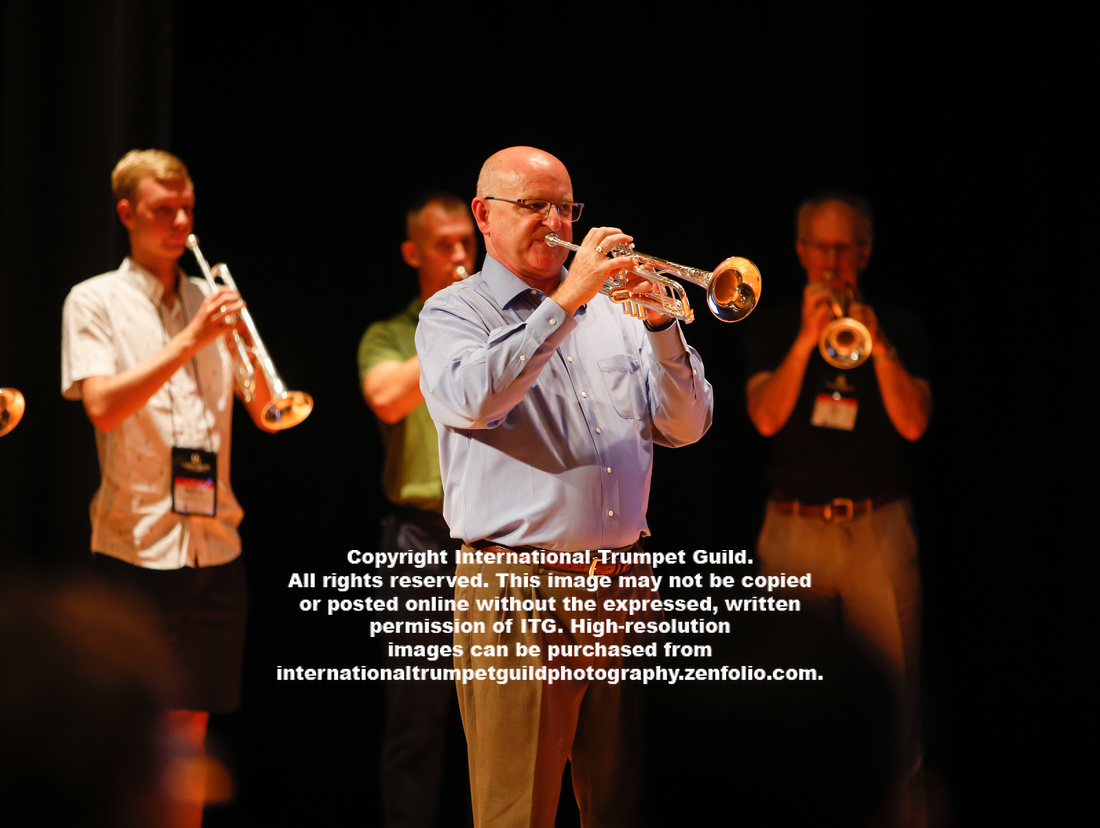

Combining Different Warm-Ups: Thompson’s Buzzing Book, DiMartinos’s Leadpipe Exercises, and Cichowicz’s Long Tones
Dr. Luis Miguel Araya started off the second day of the conference with a group warm-up session, leading the participants through a series of exercises that focused primarily on buzzing and slurring. A good deal of energy was devoted to starting off on the “right foot.” He led the group through a thorough series of Buzzing Basics exercises and then continued into a set of Cichowicz flow studies. Much of the session involved call-and-response playing, as well as a generous amount of professional direction. Araya kept a good pace throughout the early-morning session with energy and humor. Participants surely benefited from a healthy warmup as they headed off to the exhibit hall. (ED)
The Aging Trumpeter
Considering that this lecture began with a photo of Roy Rogers’ iconic horse as a “Trigger” warning, saying “You’re all going to get old, and stuff is going to break down,” the content and presentation of this “doom and gloom” topic was informative, insightful, and entertaining. Donald Robertson explained typical physical effects from aging that one can expect on muscles, respiration, vision, and hearing, along with its general diminutive effect on cognition and our abilities to maintain attention. Kevin Eisensmith synthesized that data from a trumpeter’s perspective, having struggled with (and resolved) changes that affected his playing due to factors including weight loss, lip injury, and even an allergic reaction that resulted in “flabby lips syndrome.” Fortunately, there is good news along with that of our inevitable decline, and both men outlined practical ways for trumpeters to navigate the aging process, taking those variables into consideration. Applying a process of SOC (Selection - Optimization - Compensation) will be helpful to determine well-defined goals that fit one’s resources, approach one’s daily practice thoughtfully and deliberately, and creatively and artfully compensate for those aspects in our playing that are no longer as fluent. Ideally, we are still continually striving to improve and not merely “maintain.” Our ultimate goal can and should be to find enjoyment in performing the trumpet with less frustration and a thoughtful approach. It is important to know what is happening physically while not allowing it to rule us mentally or diminish our confidence. (PS)
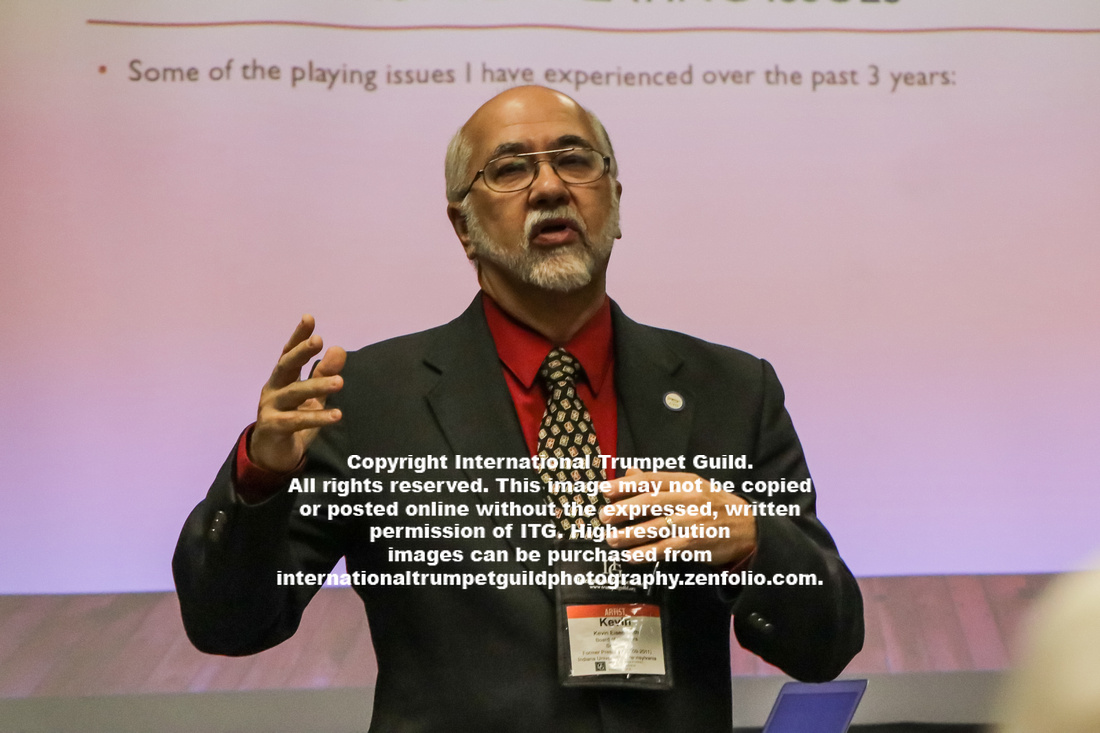

Trumpet Archaeology and Digging for Treasure: Estonian Trumpet Music
Led by Dr. Susan Barber Kahro and Dr. Karen Gustafson, the morning was off to an intriguing start with a lecture-recital that exposed viewers not only to Estonian culture in the Soviet era, but also to several lesser-known gems in the repertoire for trumpet and piano by Estonian composers. Kahro explained the cultural, historical, and musical background of each piece, including a brief formal analysis, before it was then ably performed by Gustafson. Arguably the most well known of the works on today’s program, Eino Tamberg’s Trumpet Concerto, Op. 42, was brought to popularity by Timofei Dokshizer and Hakan Hardenberger. The program also included René Eespere’s Flatus 1, Harri Otsa’s Sonatine, and Veljo Tormis’s Kümme tegemist trompeti ja klaveriga. Kahro’s historical context and Gustafson’s passionate, expert playing brought each of these treasures to life and created a highly enjoyable experience for all in attendance. (WK)
Wind Band Excerpts Competition
This year’s Wind Band Excerpts Competition, a staple event of the ITG Conference, featured finalists Ross Mitchell, Stephen Spink, and Tyler Moore, all students of Wiff Rudd and Mark Schubert at Baylor University. The contestants performed the following excerpts, all in the following order: Charlier’s Etude No. 6, Rimsky-Korsakov’s Procession of the Nobles, Copland’s Outdoor Overture, Stravinksy’s Soldier’s Tale, Hindemith’s Symphony in B-flat, Grainger’s Lincolnshire Posy, Sousa’s Hail to the Spirit of Liberty, and Arban’s Variations on a Theme from “Norma” by V. Bellini. Moore performed first, displaying exceptional lyricism and expression in the Grainger. Spink followed and demonstrated outstanding technique and cornet style in the Arban variations. Mitchell was the final competitor and exhibited a rich and powerful orchestral tone in the Hindemith. The judges will certainly have their work cut out for them, determining a winner among these three fine players. (MY)
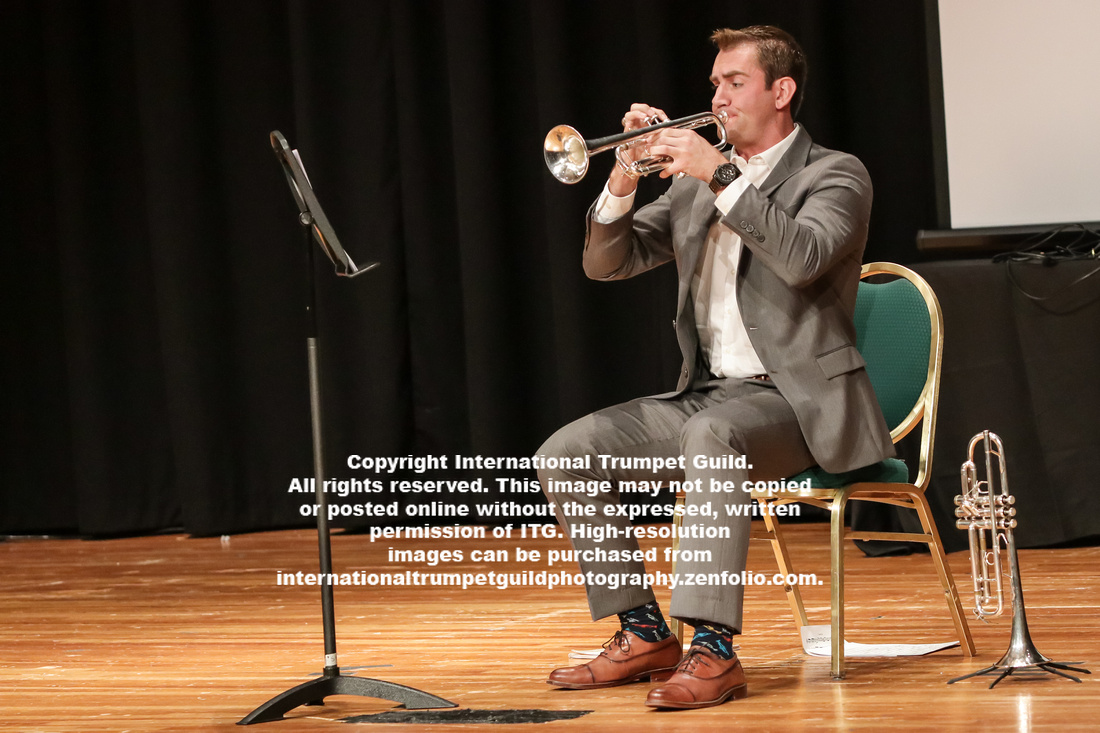

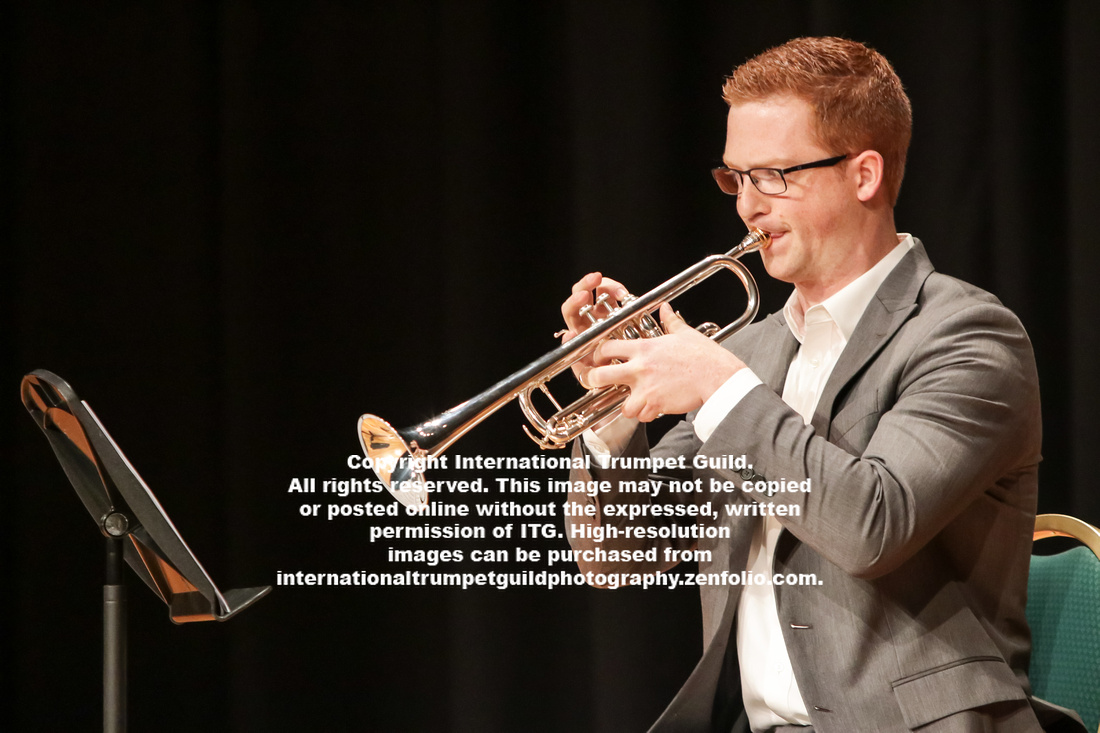

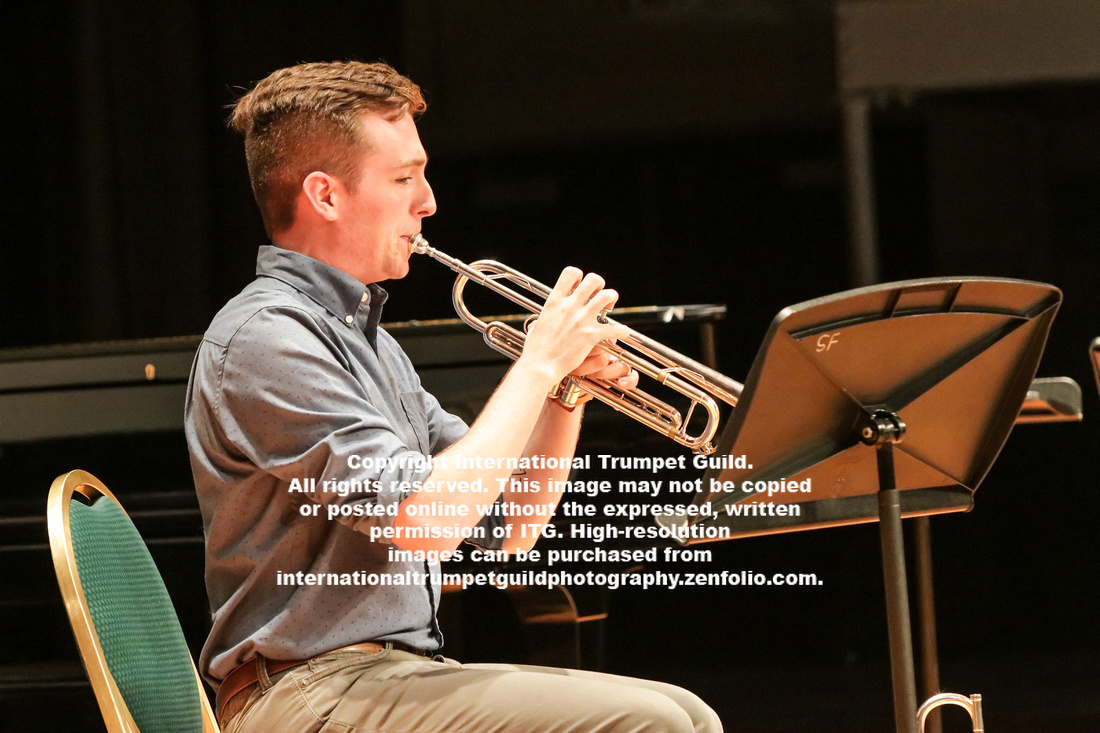

The Expatriate Trumpeter
Born, raised, and educated in the United States, Joseph Bowman has been the trumpet professor at Mahidol University in Bangkok and a member of the Thailand Philharmonic since 2003. Americans interested in working abroad often contact him as an expatriate, and this session addressed frequent questions concerning job opportunities teaching at all levels, performing in many genres, and consulting as an expert. Job websites like ITG, international music schools, College Music Society, Chronicle of Higher Education, HigherEdJobs.com, and Musical Chairs, as well as other standard resources offer some employment opportunities. Developing countries are not regularly included, however, and require personal connections and/or visits. Bowman’s firsthand accounts of cultural differences and resulting shifts in perspective were explored. He discussed the relative strengths that he has experienced in different parts of the world: pedagogy in the United States, artistry in Europe, and community in Asia. Working abroad offers opportunities for growth, interaction, and making a difference, and Joe Bowman shared his valuable insights with the rest of the trumpet community. (LE)
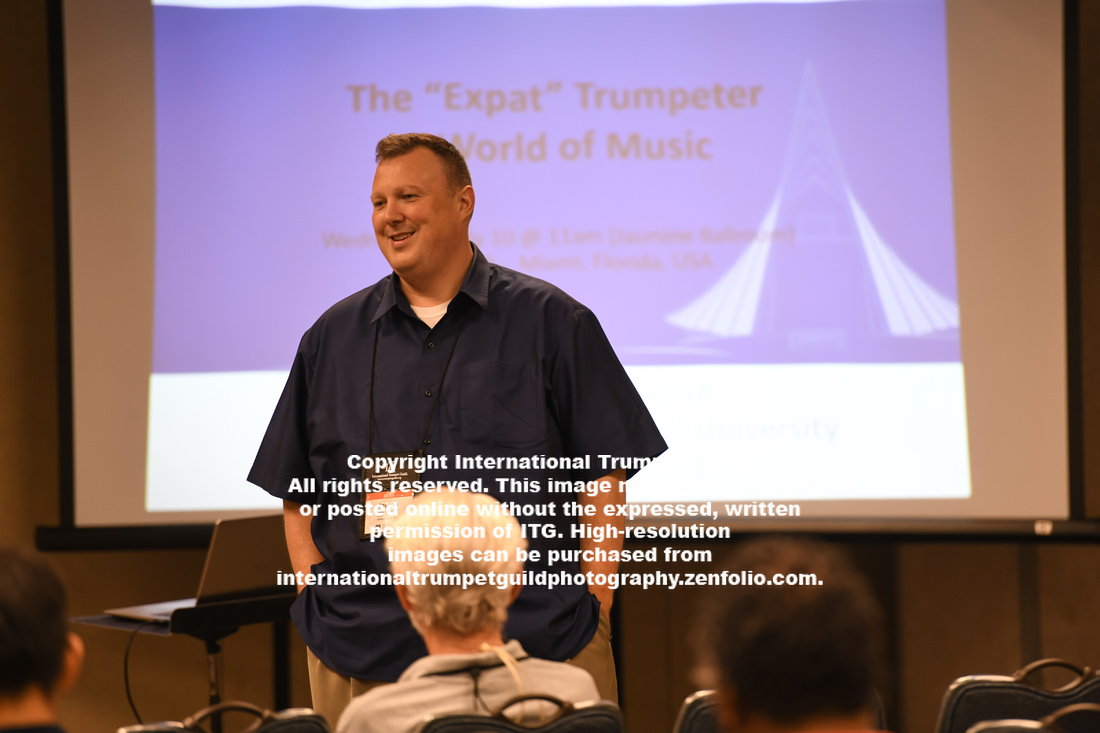

Romain Leleu Recital
The morning recital by Romain Leleu and Rebecca Wilt was simply stunning. Except for the opening piece (a lightning-fast performance of Alexander Goedicke’s Concert Etude), the program focused on French repertoire, from Théo Charlier’s Solo de Concours to Georges Enesco’s Legende and much more. To cap off this marvelous recital, Leleu delivered an effortless rendition of Jean Baptiste Arban’s Carnival of Venice. The ease with which Leleu navigated difficult passages and the rich, warm, pure sound emanating from his bell throughout the recital were simply breathtaking. Add the ever-engaging stylings of Rebecca Wilt on the piano, and the recipe for a memorable trumpet recital was complete. (TT)
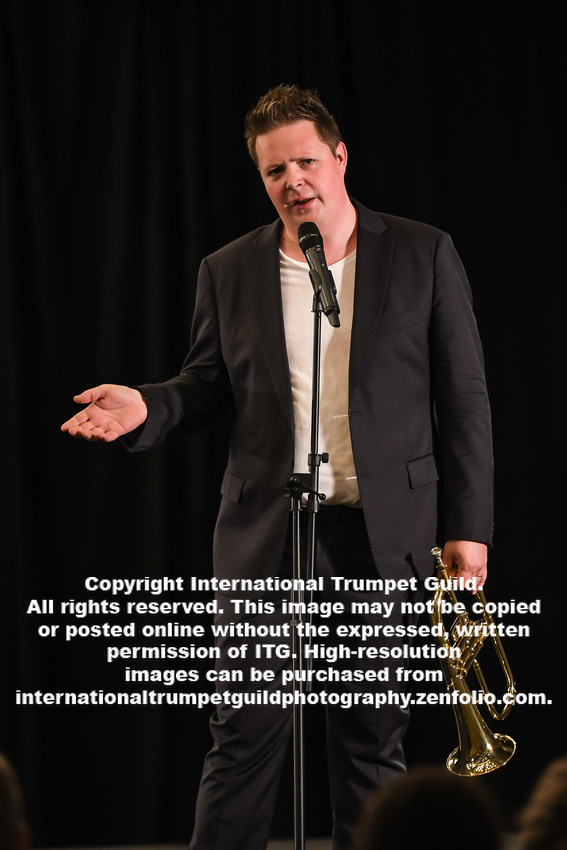

Working in Academia: What to do AFTER You Win Your First Job
Dr. James Johnson gave a detailed, well-researched, and very personal presentation on how to keep an academic post after first winning it. His presentation was divided into three parts. The Transition” addressed the crucial elements of how to leave one’s current position. In “Preparing for the New Job,” Johnson talked about how to navigate a new environment and build rapport with new colleagues and students. Finally, he opened “Doing the Job” by brainstorming all the responsibilities of being an applied teacher and discussed each in further detail (even the duties not included in the job description). With four years of teaching experience at Kansas State University, he has firsthand knowledge that led to an incredibly informative lecture on the challenges of moving into a new job and keeping it. (SB)
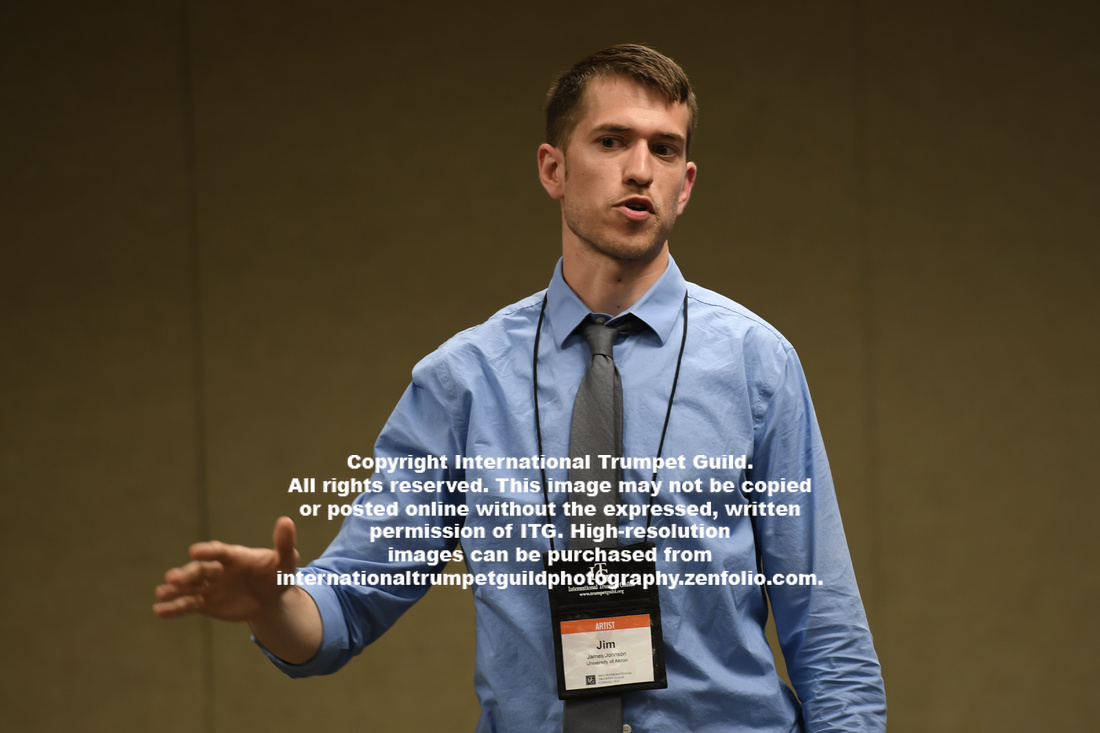

From Bach to Bernstein: Music for Trumpet and Piano
Richard Carson Steuart, founding member of the trio that would become German Brass, performed a beautiful and heartfelt recital. Opening with Variations on Acteon by Arban, he played with sweeping lyricism and dolce vibrato on an A cornet that he both designed and built. Several times during the recital, he mentioned that he was experiencing pain from a lip injury he sustained during his travel to Miami. In spite of this, he remained calm, cool, and musically exciting in his delivery of a diverse and demanding recital. He performed Enesco’s Légende on B-flat trumpet and uniquely used a solotone mute for the final passage. He also performed a movement of Vejvanowski’s Sonata in G minor on natural corno da caccia and was joined on stage by Daniel Crespo for a transcription of Stölzel’s Concerto for Violin and Oboe. The unique and inspiring program concluded with Dokshizer’s arrangement of Rhapsody in Blue. (JB)
Jazz Improvisation for the Classical Musician
Many classically trained musicians struggle with effectively communicating authentic-sounding and stylistically accurate musical ideas when asked to improvise in jazz and commercial musical contexts. The root of the problem, according to Joe Montelione, is a type of paralysis through analysis when confronted with the challenge of creating something from nothing in real time. Montelione presented a systematic approach for individuals to overcome these difficulties and develop comfort in contributing to a musical conversation as equal parts composer, performer, and listener. Points of emphasis in developing the ability to create without the aid of written music included genuinely studying the craft, stepping out of one’s comfort zone, realizing one’s artistic objective, establishing confidence, listening, collaborating, trusting, and practicing. Other important points that Montelione discussed included simplifying and just playing. The idea of staying in the moment and focusing on the fun cannot be stressed enough. (AD)
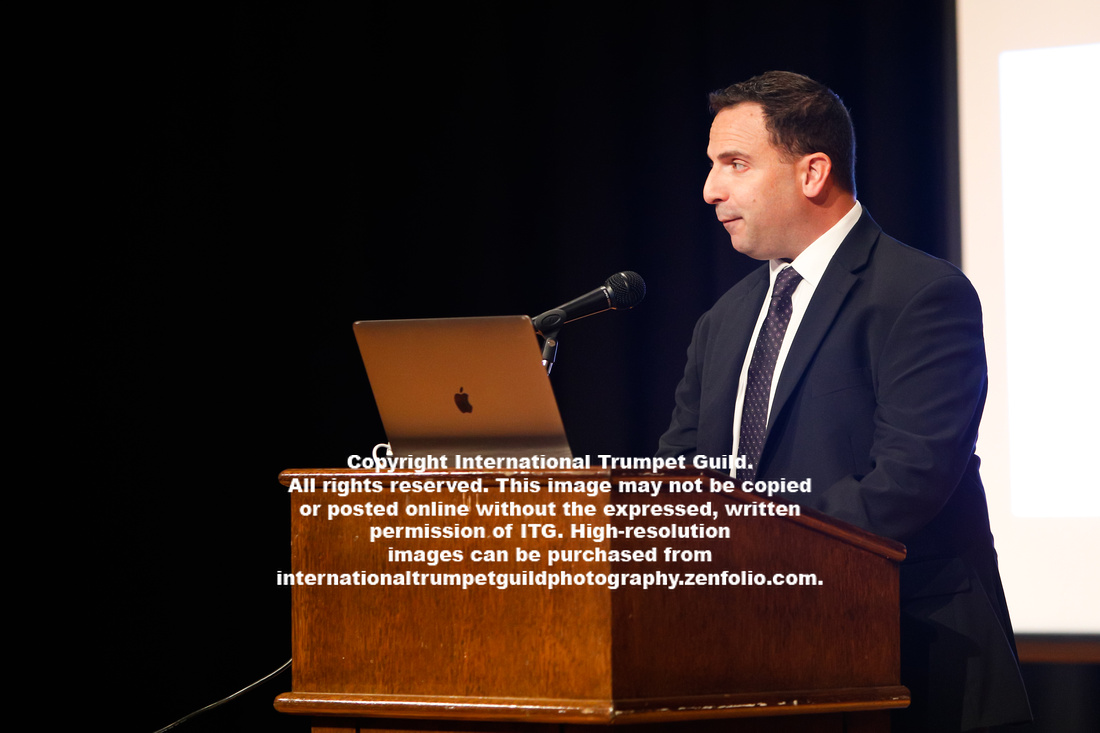

Jazz Improvisation Competition
After brief introductions by Chase Sanborn and Jason Carter, each of the three finalists in the ITG Jazz Improvisation Competition was allowed twenty minutes for two required tunes (Airegin and I Can’t Get Started) and one tune of the competitor’s choice.
First on stage was Ethan Avery, who was accompanied by the competition trio, the Chuck Bergeron Trio, consisting of Chuck Bergeron (drums), Zach Bartholomew (piano), and John Yarling (bass). Avery started his set with Airegin, showcasing his technique and efficiency and creating a brisk start to the competition. He continued to show all sides of his playing and musical sensitivity through a beautiful rendition of I Can’t Get Started, and his third piece was an original composition, Hopefully I’ll Know. Avery said that the tune was about a month old, so he was excited to test it out at this competition.
Brandon Choi opened with his optional tune, Herbie Hancock’s Dolphin Dance, demonstrating Choi’s velvety tone, sensitive use of space, and creative ideas in the low register. He ended the tune with an unaccompanied solo that led seamlessly into I Can’t Get Started. The ballad seemed to lend itself well to Choi’s playing, which was relaxed and comfortable throughout. He took time to introduce members of the trio before jumping into his final tune, the bebop standard Airegin, bringing a lively end to Choi’s portion of the competition.
Alec Aldred made a bold statement when he kicked off his set with a Latin version of Airegin. Following with his lovely rendition of I Can’t Get Started, Aldred continued to demonstrate a solid sound, coupled with great style and creative ideas. Aldred considers himself a composer as much as a trumpet player, so he took the opportunity to show his writing skills by ending with an original composition entitled You Lose, You Snooze, making for a light-hearted end to the competition.
All three candidates gave a strong and musical presentation that resulted in an afternoon that felt more like a concert than a competition. (WK)
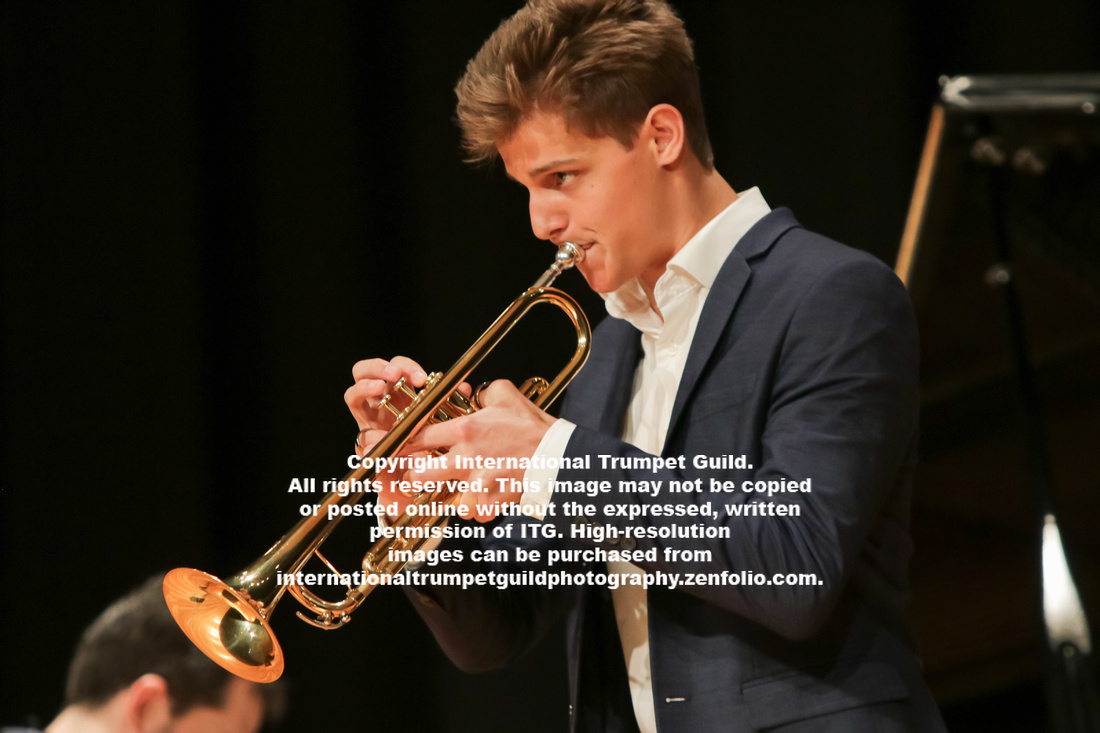

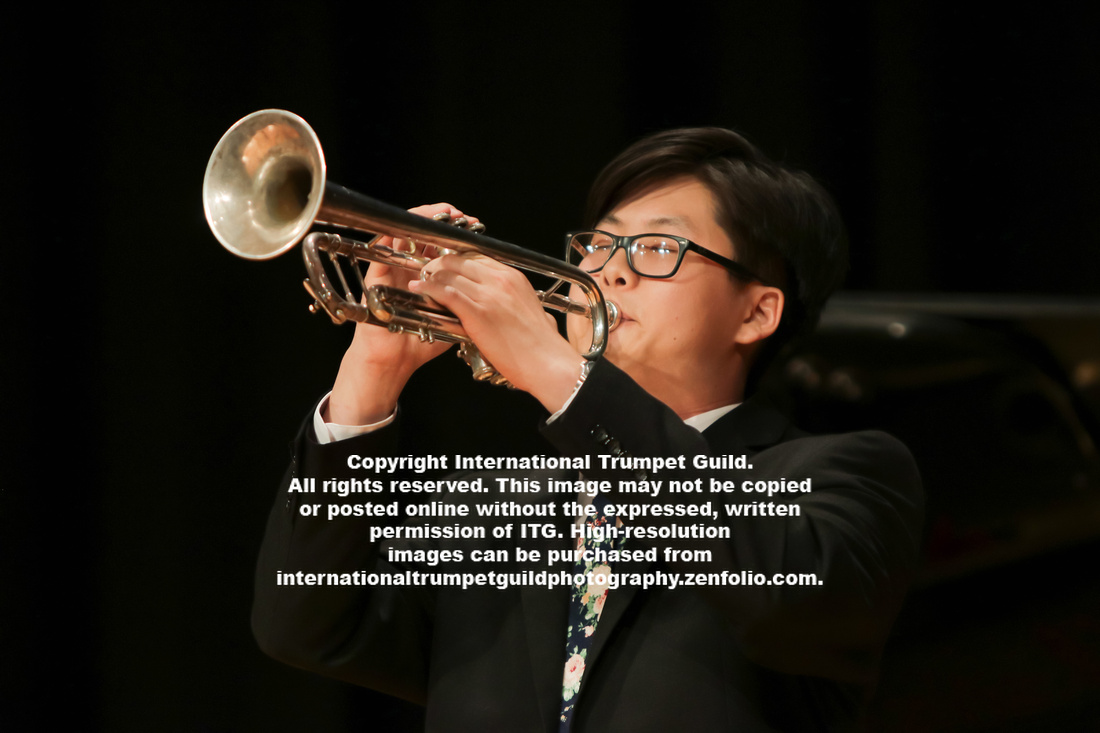

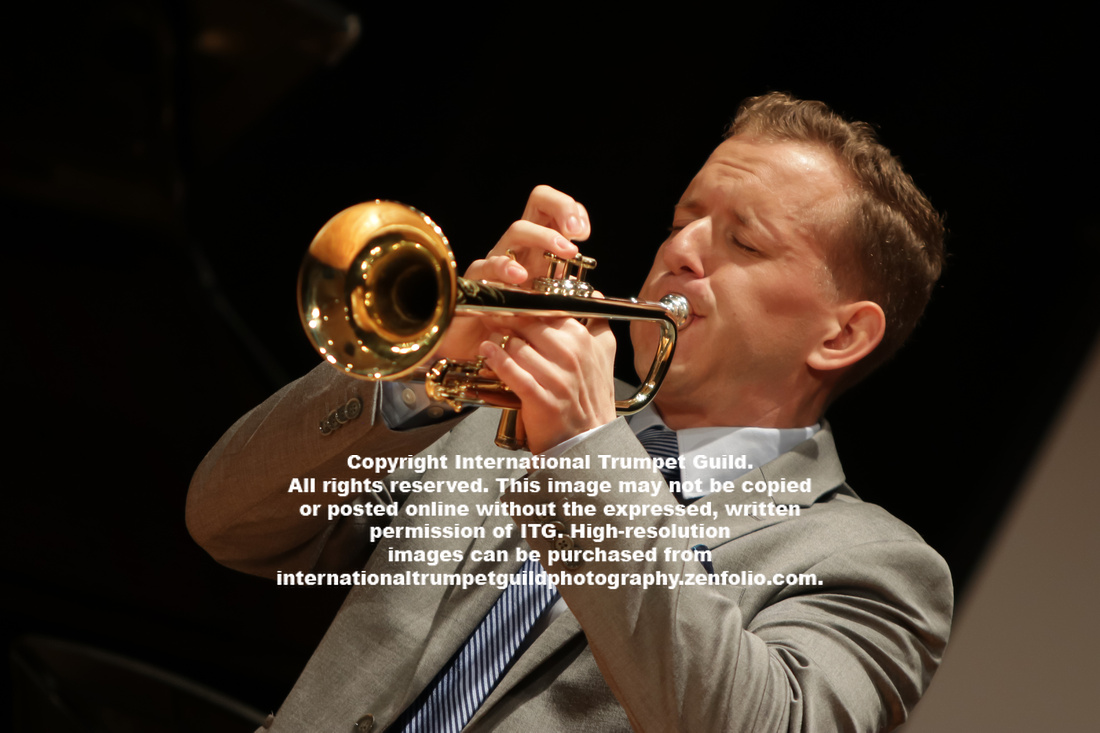

Perform from Memory? But I Play the Trumpet!
Brian Reichenbach and Terry Everson gave a wonderful lecture on the art of performing from memory. With an emphasis on how everyone has the ability to memorize, Reichenbach and Everson shared their personal experiences with memorization and how it has been beneficial not only in their own journey as musicians, but also as an integral part of their teaching. Everson made it clear that memorization should be more about focusing on playing the instrument and developing the ear. He also shared that doing formal musical analysis for any piece can aid in faster memorization and a better understanding of the work. Reichenbach and Everson talked about the legitimate reasons why many people choose not to memorize music, but they explained that whatever the reason, performing from memory has wonderful benefits like the freedom from playing off the page and the development of the ability to turn a performance into a conversation with the audience. (SW)
Click here for more photos from the ITG Conference